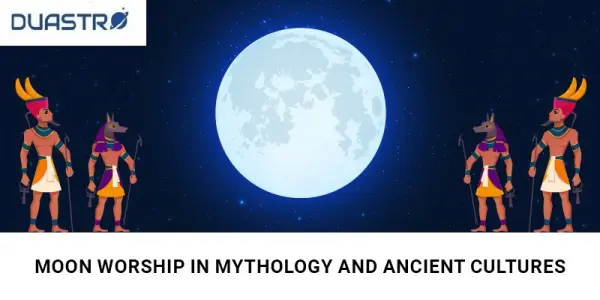Introduction to Moon Worship in Mythology & Ancient Cultures
The Moon has fascinated humans for centuries not only for its physical beauty but also for its deep spiritual & mystical significance. Across various ancient cultures & mythologies the Moon was worshipped as a powerful deity symbolizing femininity intuition & change. From the serene lunar goddesses of Greek & Roman mythology to the fierce moon deities in Indian & Chinese traditions the Moon energy was believed to impact human emotions nature cycles & spiritual practices. In astrology the Moon governs the mind emotions & unconscious patterns making it a vital planet in every individual planetary chart. By famous astrologer Astro Vikram Singh who has over 20 years of experience in Vedic astrology & mythology understanding moon worship can bring balance & emotional clarity into one life.
Benefits of Moon Worship & Its Astrological Significance
Moon worship is not just an ancient practice; it holds practical benefits in today life as well. Worshipping the Moon or conducting rituals under its phases can help individuals connect deeply with their inner self improve emotional intelligence & cultivate peace. Astrologically the Moon represents our mental peace motherly instincts & emotional needs. Regular lunar worship can help balance a weak or afflicted Moon in one life predict leading to emotional stability & mental clarity. This is particularly beneficial for individuals facing mood swings anxiety or issues related to the mother. For students & professionals Moon worship enhances creativity & imagination providing fresh perspectives & clarity in decision-making. It also improves one nurturing abilities making family & relationship bonds stronger as supported by family horoscope understands.
Types & Variations of Moon Worship Across Cultures
Moon worship varies widely across different cultures & time periods. In ancient Egypt the Moon god Thoth symbolized wisdom & was a protector of scribes. Greek mythology honored Selene & Artemis as lunar deities representing purity & wilderness. In Hinduism Chandra Dev is worshipped during the Purnima (full moon) & other lunar festivals such as Karva Chauth. Chinese cultures celebrate the Mid-Autumn Festival where the Moon is honored for unity & family harmony. Each culture form of Moon worship reflects unique rituals & symbolism but centers on the same core values of emotional balance enlightenment & spiritual connection. These variations help astrologers give personalised understands in astrology houses analysis guiding people according to their cultural backgrounds & beliefs.
How & When to Practice Moon Worship Rituals
Practicing Moon worship requires sincerity & alignment with lunar phases. The most powerful times to connect with lunar energy are during the full moon & new moon. On full moon nights people engage in meditative practices offering milk water white flowers & chanting moon mantras like "Om Chandraya Namah". This helps strengthen the Moon impact in one horoscope. Women primary benefit from these rituals as the Moon governs feminine energy & cycles. New moon nights are ideal for introspection & setting emotional intentions. Moon worship can also be part of regular spiritual maintenance for those with unstable mental health horoscopes. Rituals may include bathing under moonlight wearing white attire or keeping fasts. In astrology consultations experts like Astro Vikram Singh recommend these rituals personalised to a person birth chart aligning them with their kundli dosha corrections.
Remedies & Practices to Strengthen Moon in Astrology
When the Moon is weak or afflicted in a birth chart it can cause emotional instability sleep disorders & lack of peace. Remedies to strengthen the Moon include regular moon worship & wearing gemstones like Pearl recommended by gemstone calculation tools. Fasting on Mondays donating white food items such as rice & milk & respecting the mother & elderly women are also effective remedies. Meditation on the Moon reciting the Chandra Beej mantra & offering prayers during Purnima can greatly strengthen lunar impact. In some cases astrologers may advise detailed rituals through free janam kundli analysis helping individuals understand the exact placement & impact of the Moon in their birth chart. These solutions not only stabilize emotions but also increase mental peace intuition & nurturing qualities essential for overall well-being.
Conclusion: Wide Moon Worship for Emotional Balance
Moon worship rooted in ancient mythology & cultural practices offers timeless wisdom for emotional healing & spiritual growth. Its relevance in astrology highlights the Moon powerful role in governing our mind & emotional health. By practicing lunar rituals individuals can align their energies with nature rhythms cultivating peace & clarity. Whether through full moon meditations mantra chanting or traditional fasting each practice strengthens one inner world. With guidance from seasoned astrologers like Astro Vikram Singh whose expertise bridges ancient knowledge with modern astrology one can find meaningful ways to join moon worship into daily life. For those seeking further guidance on their life path exploring services like relationship astrology or health horoscope can give thorough understands. Increase the wisdom of lunar worship & let the Moon shed light on your spiritual journey.
About the Expert: Astro Vikram Singh
Astro Vikram Singh is a famous Vedic astrologer with over 20 years of expertise in planetary astrology mythology & remedial solutions. His deep understanding of ancient scriptures combined with practical guidance has helped countless individuals find clarity & peace in their lives. He specialises in moon-related astrology planetary remedies & spiritual counseling. Through his contributions to Duastro Astro Vikram Singh continues to spread awareness about the deep connections between celestial bodies & human emotions making ancient wisdom accessible to modern seekers.





















